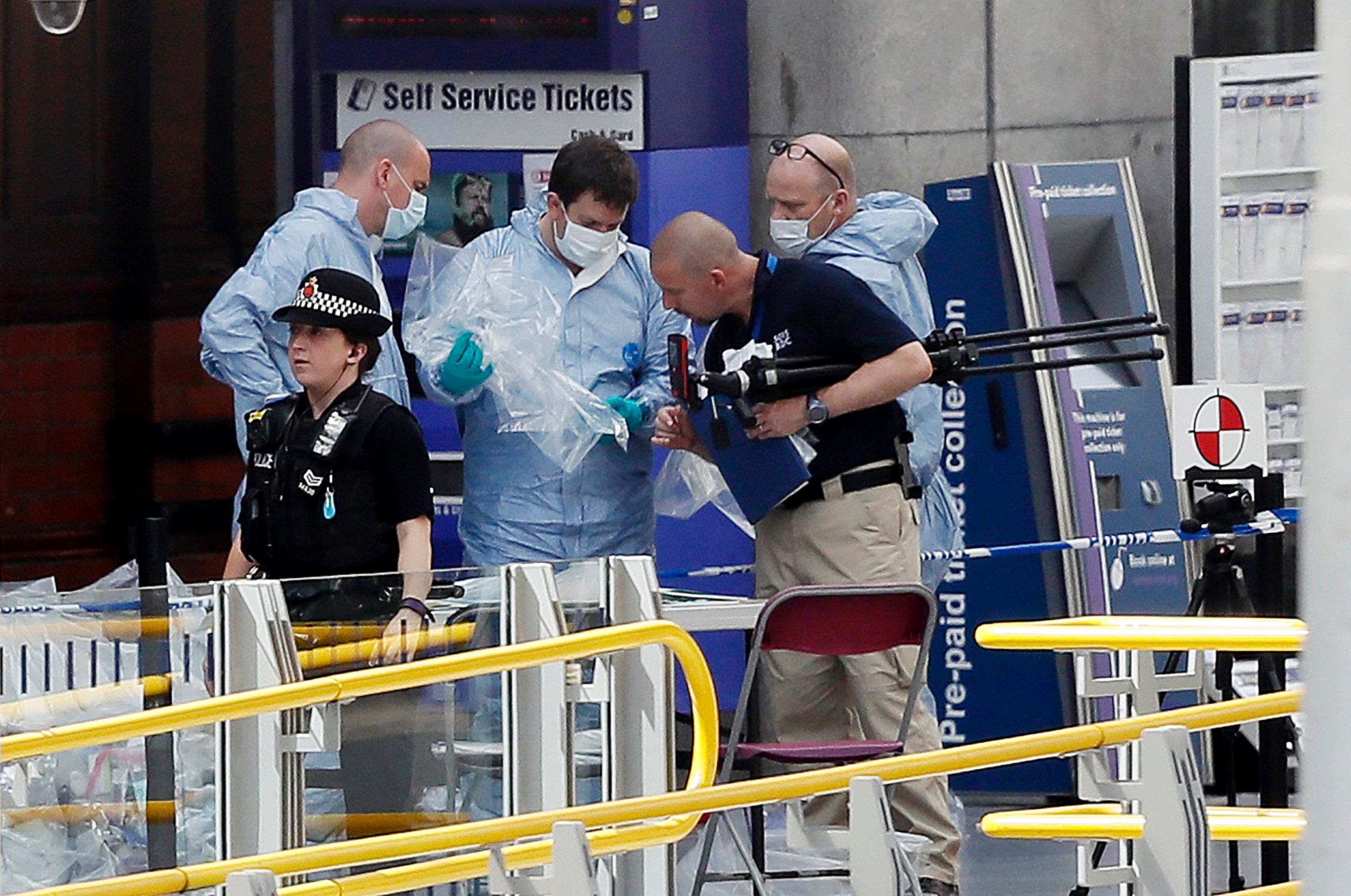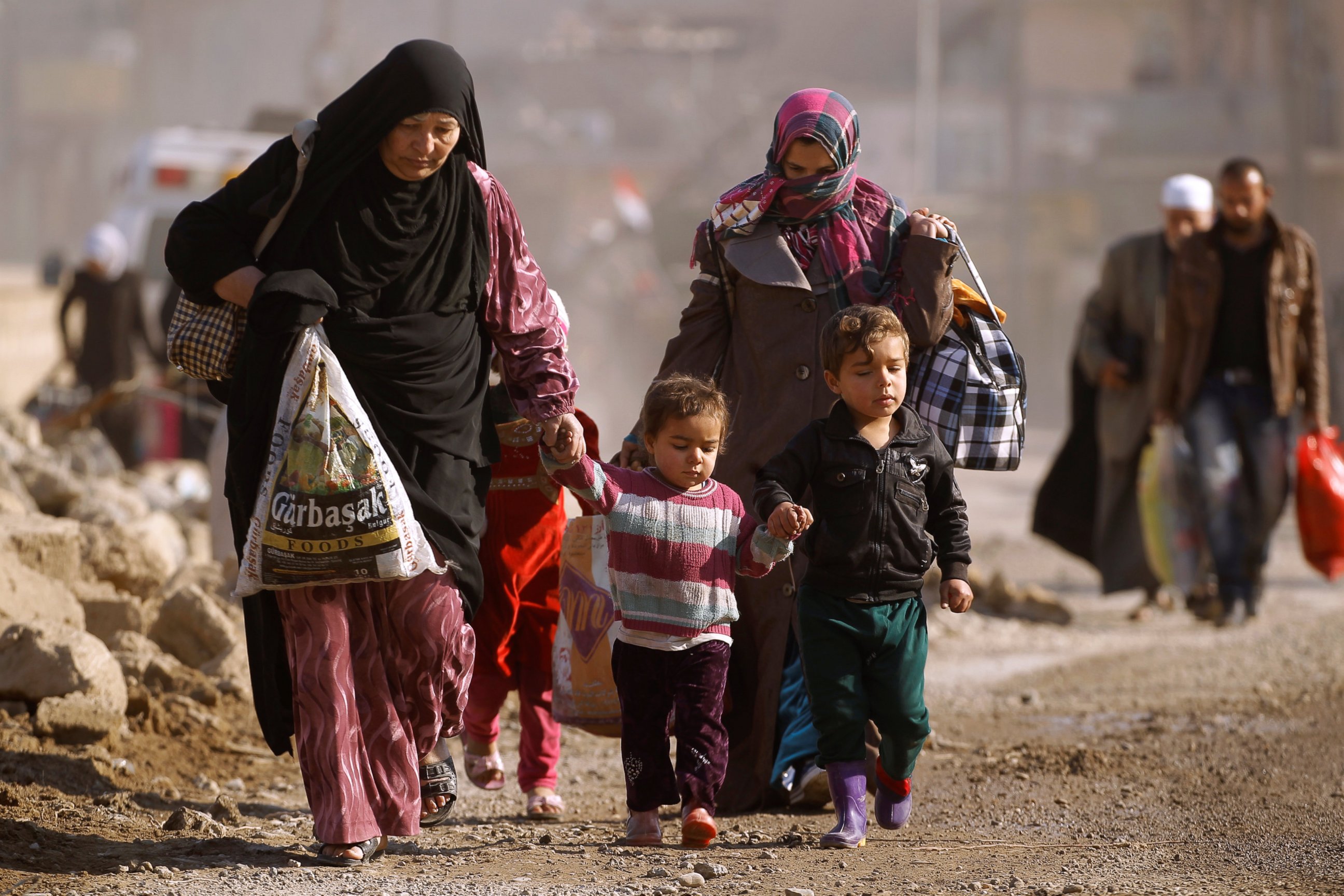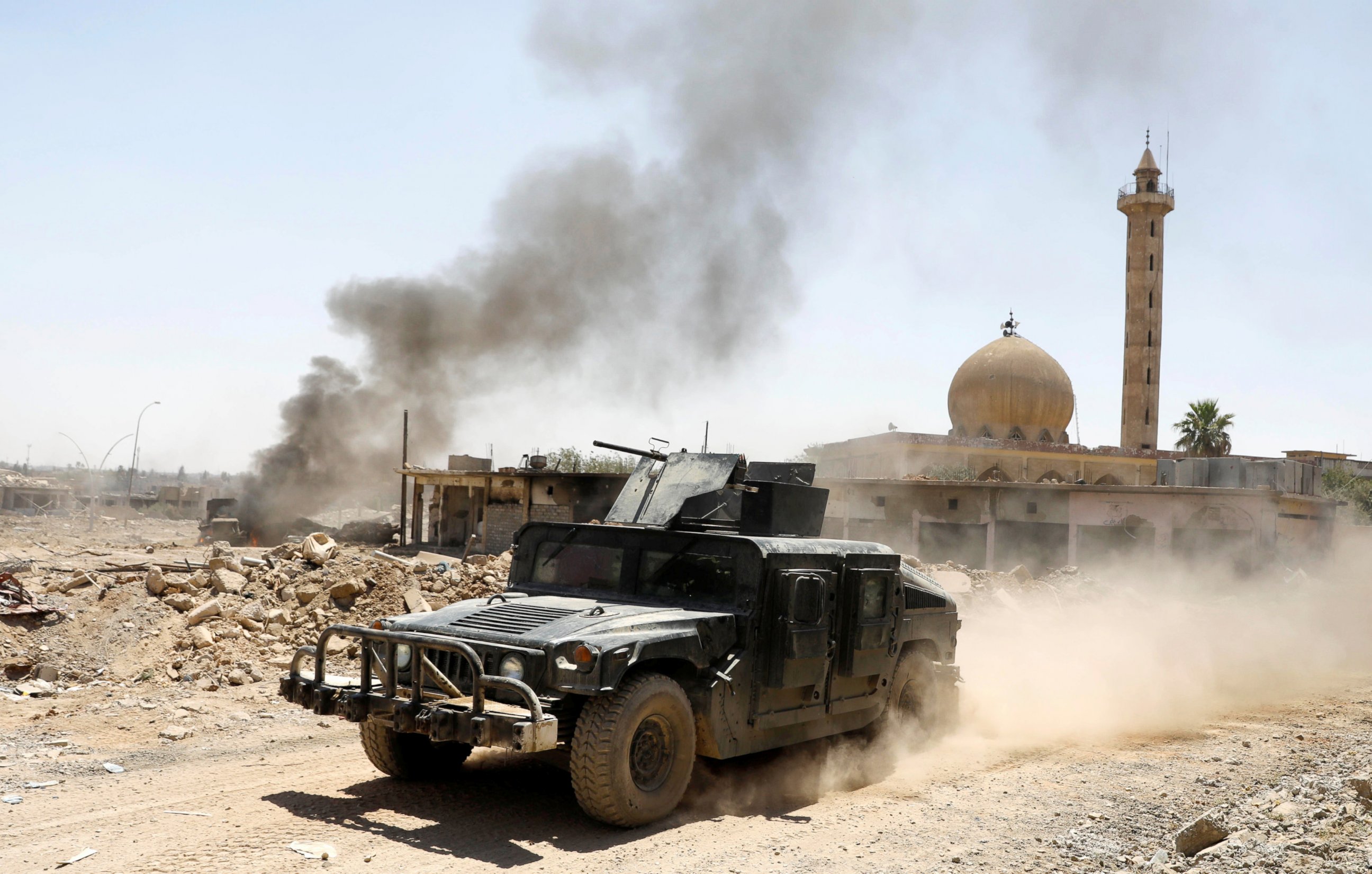ISIS counting on anti-Muslim backlash 'to sharpen the divide,' experts warn
Experts say the group wants to drive a wedge between Western Muslims and others.
— -- As ISIS claims responsibility for one attack after another, experts warn that understanding the terrorist group’s geopolitical, ideological and religious motivations are crucial to stopping it.
The U.S.-backed military offensive to retake ISIS-held areas of Iraq and Syria, coupled with propaganda during the holy month of Ramadan, could be contributing to the recent increase in attacks in Europe.
Experts also say an ongoing directive from the group's leaders for believers to fight with whatever is available and anti-Muslim backlash in Western societies after such attacks may also play a key role.
"I think you've seen a slight uptick right now because ISIS has put out a message to its followers saying, 'Don't come to Syria, don't come to Iraq, stay at home and create a problem,'" Jeffrey Ringel, a director at the Soufan Group and 21-year veteran of the FBI, told ABC News.
"That message came out about a year ago when it became more difficult for people to go there. ISIS was losing its land mass, they were losing their caliphate, so the leader of ISIS basically encouraged followers to stay home and attack Westerners in their own backyards," Ringel added.

There's no doubting ISIS's shrinking land mass.
By early Tuesday morning, fighters from the Syrian Democratic Forces had retaken nearly 4 square miles outside of the city of Raqqa as part of their latest offensive against ISIS. And Iraqi forces had successfully fought to retake about 190 square miles from ISIS near Mosul, according to a May 5 U.S. Department of Defense news release.
ISIS propaganda during the holy month of Ramadan, when Muslims around the world devote time to fasting, studying the Quran and cleansing their spirit, is also a factor, according to Joby Warrick, author of "Black Flags: The Rise of ISIS" and the national security reporter for the Washington Post. The group has been encouraging its followers to commit violent acts during Ramadan since at least 2015, and violence has spiked during the holiday in the past.
"When you follow their propaganda online, it's almost like a PR campaign that has sort of promotional cycles," Warrick said. "They have now, for a couple of years, emphasized Ramadan as a holy time, so when people are fasting and thinking holy thoughts, they should also carry out attacks against convenient targets."
"Essentially, it's like, 'It's the holiday season, it's time to consecrate yourself to Allah by killing someone.' That's kind of what we are seeing right now," Warrick added of the monthlong holiday that began May 26.
But violence is not a fundamental part of Islam, said Carla Power, author of "If the Oceans Were Ink" about a yearlong examination of the Quran in which she engaged with Sheikh Mohammad Akram Nadwi, an influential scholar and imam.
"These groups are a tiny, tiny minority of really fringe elements who are rejected overwhelmingly by mainstream imams and Muslims," Power told ABC News. "I do draw the line at saying they're not connected to Islam at all because, clearly, they're wrapping themselves in the flag and the language of Islam. But they're trying to give legitimacy to what is effectively criminal behavior and a highly political land grab."

Fundamental misunderstanding of and the desire to equate the beliefs of all Muslims with those of ISIS plays directly into the terrorist group's strategy, Warrick said.
"They want to raise this Muslim army, and they commit terrorism attacks abroad in order to sharpen the divide and make it harder for Muslims in their adopted homes," he said. "Not because young Muslims are necessarily going to be inspired by the terrorist acts but because they anticipate that there will be a backlash against Muslims; that it will be so painful to be a Muslim in a place like London because of regulation or discrimination or people looking at you like you're dangerous because you're Muslim.
"All of that drives a wedge between Muslims and makes them uncomfortable in the places that they live, and thus more apt to join [ISIS's] side," Warrick added.
Seizing land and preparing for the apocalypse
ISIS rose out of the group that once called itself al-Qaeda in Iraq, Warrick said. It was previously run by the late Abu Musab al-Zarqawi, whom the U.S. Air Force killed in a bombing raid in Iraq in 2006.
"This figure, al-Zarqawi was really a loser and a nobody who history would never have heard of except for the fact that the U.S. decided to invade Iraq in 2003,” Warrick said. “The invasion give him this platform that he always wanted, and dismantling the Iraqi government and armed forces gave him an army of unhappy former colonels and majors who wanted to fight the Americans and now had a leader to command them.
“That was kind of the original sin that allowed this group to flower: everything from what it professes to its use of the internet to its brutal displays of violence."
Warrick said al-Zarqawi was initially rejected by al-Qaeda because he was too extreme.
"Bin Laden tried to personally rein them in and get them to stop doing things like beheading people on the internet, and they insisted on going their own way," Warrick said. "This rift that started between al-Zarqawi and bin Laden is still the rift that exists between al-Qaeda and ISIS."
After al-Zarqawi's 2006 death, Abu Bakr al-Baghdadi took over and the group was renamed the Islamic State of Iraq and the Levant. The group was able to take advantage of the chaos resulting from Syria's civil war and the Arab Spring to gain a foothold.
ISIS believes that it is responsible for creating a caliphate, or state governed by an Islamic ruler and religious successor to the Prophet Mohammed, on earth, according to the group's leader, al-Baghdadi.
The group has forcibly taken over land in Syria and Iraq to achieve that aim. ISIS's treatment of religious minorities, including Yazidis and Christians, has been especially brutal, according to Matthew Barber, a Ph.D. student studying Islamic thought and history at the University of Chicago who has worked extensively with minorities in Iraq.
"IS jihadists reject the legitimacy of all worldviews that differ from their own. This orientation is inimical to any form of religious diversity or pluralism," Barber told ABC News via email. "The goal of this movement to cleanse society of any perspective contradicting their supremacist doctrine -- as well as their penchant for pillaging the wealth of their neighbors -- has made life impossible for religious minorities in areas under their control."
ISIS fighters have engaged in beheadings, systematic rape and mass killings.
In their genocide against the Yazidis, for instance, ISIS fighters went about "slaughtering all adult males who refused to be force-converted to Islam, and sexually enslaving over 3,000 women and girls," Barber said.
Unlike other terrorist groups, ISIS is fundamentally apocalyptic, Warrick said.
"This is not like al-Qaeda. You can almost think of them as part of a doomsday cult because they really do see the world heading to an end and they are part of it," Warrick said. "They see themselves as marching on the side of righteousness toward the cataclysm, which is this big fight between the rest and Islam."

ISIS fighters believe they have an important role to play in the end of the world, which will begin when Western forces and Muslims fight in the town of Dabiq, Syria.
"Way before they became known as the Islamic State, they were fixated on this idea that there was going to be an Armageddon-like battle. Their successes encouraged them to believe that this was all happening, that the prophecy was going to be fulfilled," Warrick said. "That complicates things for us because these are fanatics; they can't be negotiated with."
Anti-ISIS forces reclaimed the Syrian town of Dabiq in October of last year. Offensives to retake the ISIS strongholds of Mosul, Iraq, and Raqqa, Syria, mean that the group's territory is shrinking.
That might also explain why it is increasingly eager to claim responsibility for attacks abroad: they help the group maintain influence even as it loses land, the Soufan Group’s Ringel said.
"I think ISIS likes to say, 'Look how powerful we are.' ISIS always claims responsibility for attacks that happen anywhere in the world, but then when you go back to look at it, there is no association with ISIS. So it's ISIS trying to claim credit for something they didn't do," Ringel said.

Encouraging attackers to use whatever is available
In September of 2014, an ISIS spokesman, Abu Mohammed al-Adnani, released a statement urging his followers to use whatever was at their disposal to attack other people wherever they are.
"If you are not able to find an IED or a bullet, then single out the disbelieving American, Frenchman, or any of their allies. Smash his head with a rock, or slaughter him with a knife, or run him over with your car, or throw him down from a high place, or choke him, or poison him," al-Adnani said. "If you are unable to do so, then burn his home, car, or business. Or destroy his crops. If you are unable to do so, then spit in his face."
Al-Adnani was killed in a U.S. airstrike in Syria last year, but experts say this directive has been repeated often by ISIS and is the root of the latest unsophisticated attacks using cars, knives and other everyday objects.
"The fact that people are using everyday items show that these attacks are almost spur-of-the-moment. They don't require a lot of training, they don't require a lot of planning. All they need is for someone to rent a U-Haul, like was done the other day, and just drive like a crazy person and hop out with a knife," Ringel, the FBI veteran, said. "They're easy to commit and they're under the radar because there is no prior training or need to obtain precursor chemicals that could give them away or warn enforcement."
Such attacks also make people feel afraid as they go about their daily lives, said Dr. Karen Greenberg, director of the Center for National Security at Fordham Law School in New York.
"The frequency of these events is gaining speed, and they're starting to have a pattern as well, which is using not very technological stuff: whether it's a homemade bomb, or a car, a knife," Greenberg told ABC News. "People are more fearful when they go about their daily lives."

Counting on anti-Muslim backlash
ISIS wants anti-Muslim backlash in the wake of these attacks to help recruit more isolated and alienated people to commit acts of terror in its name, The Washington Post’s Warrick said.
"One of the reasons they want their followers to strike out around the world is because they really see this as not about killing a couple dozen Westerners in London or Paris, but about awakening the Muslim community. They want this army to materialize," Warrick said.
But the public and political leaders must be careful to differentiate between Muslims and extremists, author Power said.
"To say that it's a religion of violence based on three crazy guys who heeded people who are reviled by anybody who knows anything about the classical text or the mainstream traditions is a convenient propaganda tool for people who want to see violence in the faith," Power said.

That ISIS will capitalize on anti-Muslim sentiment makes the response after these attacks more complex, Warrick said.
"This requires a kind of maturity and leadership and thinking beyond the immediate political impulse, which would be to get tough and crack down," Warrick said. "The one thing that would be really counterproductive is to vindicate them by making this a war against Muslims, because that is what they want it to be."
"If we feed into their rhetoric by essentially declaring war on Muslims or declaring Muslims to be the enemy, then we are really helping them," he added.
Anti-Muslim sentiment can also waste law enforcement's time investigating leads that are not worth the resources.
Ringel said law enforcement agencies are already challenged by the sheer volume of tips they receive.
"It's very difficult because you're weighing freedom of expression and freedom of religion with criminality. When people cross the line of criminality, then law enforcement can act," Ringel said. "I will say from my previous experience in the FBI, we would get a lot of leads where people would call in and say, 'My neighbor is dressing in Islamic clothes, my neighbor looks at me funny, my neighbor doesn't like Jews, my neighbor won't shake the hands of women.' Ok, well they're not breaking the law."
If someone is a cause for concern, law enforcement can follow up and carry out different levels of investigation, but it's sometimes difficult to know if or when a person will decide to "go operational," he added.
Looking ahead, understanding why people join ISIS is also crucial to any efforts to de-radicalize and reintegrate them into society, Power, author of "If the Oceans Were Ink,” said.
"You talk to people in this space and they say that we have to get ready for the influx of people coming back, if that ever happens, both from a security standpoint but also looking at if there is a chance that these folks can turn. It's a political hot potato, certainly,” Power added.
“But the people who are thinking about these things are looking to see if there is a best practice and an alternative to 'lock them all up.’ Power said. "In all but the most hardline quarters, there's a sense that there have to be new ways of looking at this."




